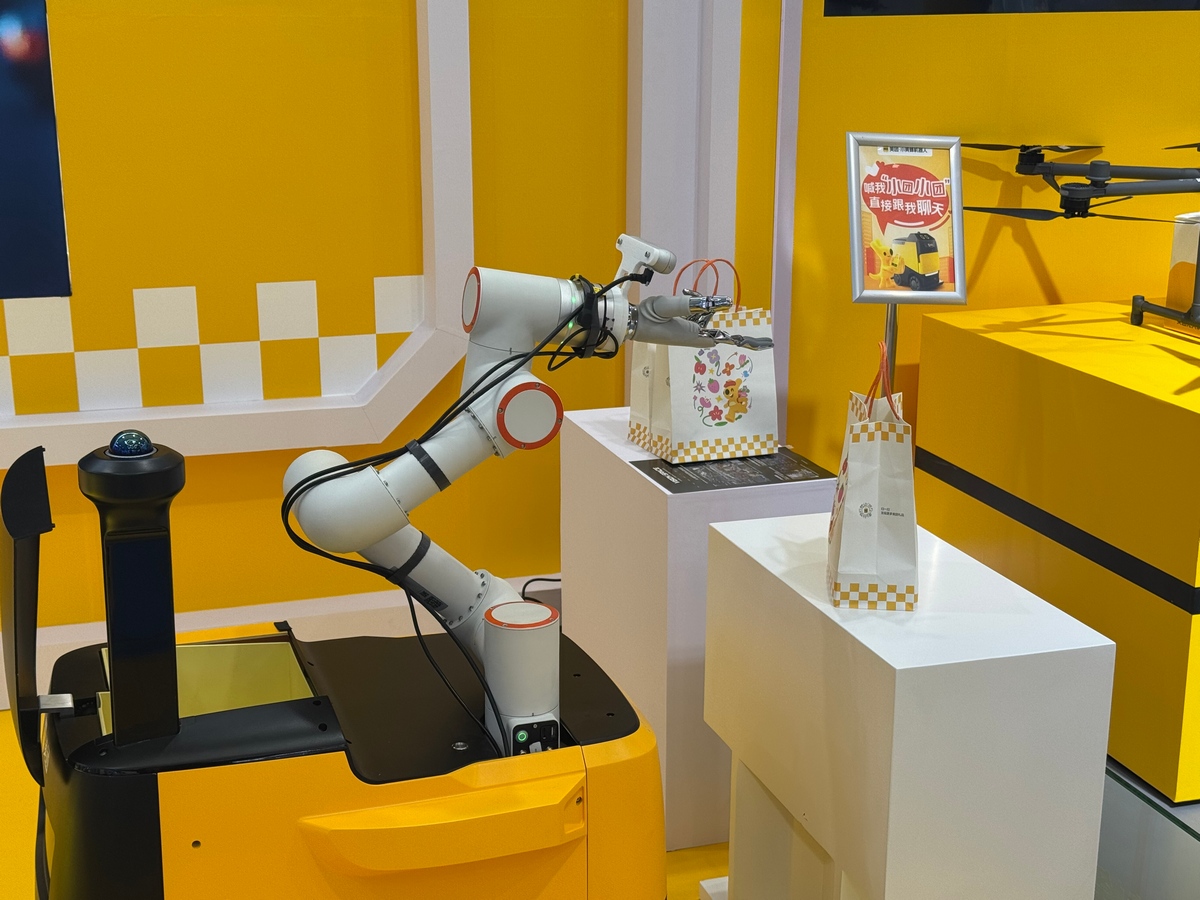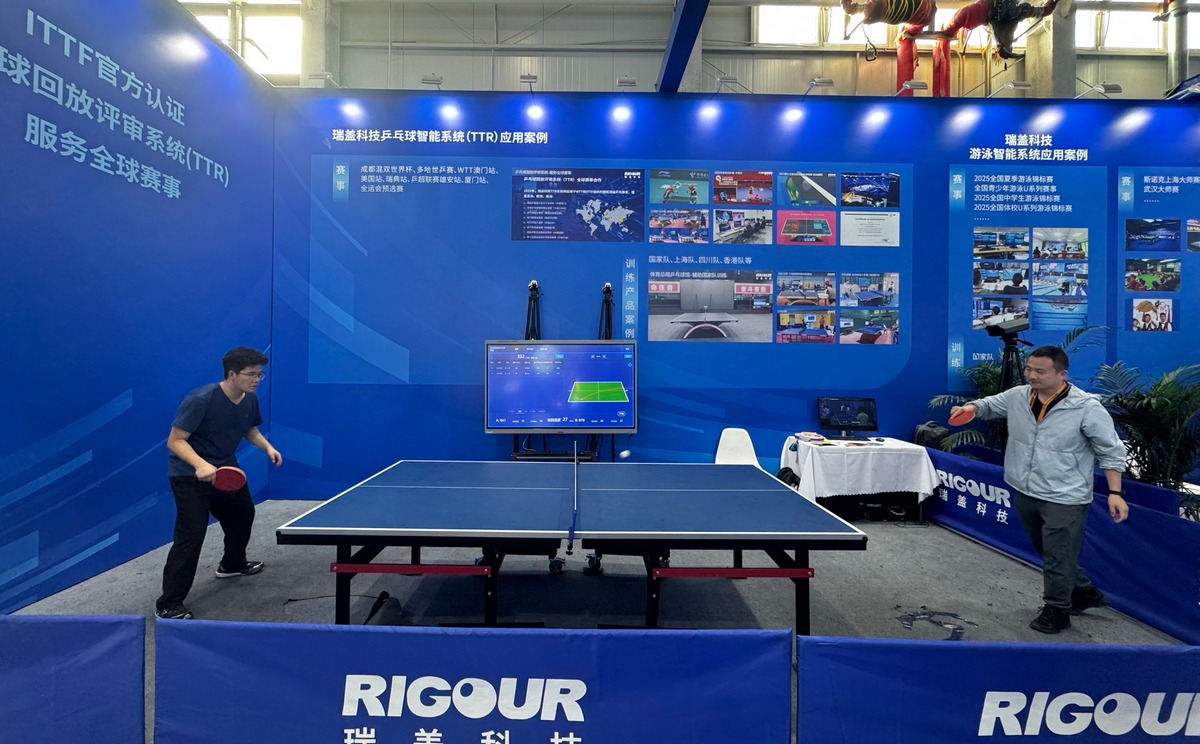Chinese services companies showcase cutting-edge technologies, innovations at CIFTIS

A view of Meituan's integrated indoor-outdoor embodied intelligent delivery robot at the ongoing China International Fair for Trade in Services in Beijing on September 11, 2025. Photo: Chen Qingrui/GT
At this year's China International Fair for Trade in Services (CIFTIS), Chinese companies from multiple industries have unveiled cutting-edge technologies, showcasing how innovation is transforming services.
From supply chains and education to sports and cultural tourism, enterprises are competing to display their technological prowess during the exhibition, which runs from Wednesday to September 14. Many artificial intelligence (AI)-powered services now showcased at the CIFTIS have already reached mature, large-scale application in China.
In the supply chain section, Chinese logistics company ZTO Express presented its proprietary unmanned vehicle management platform, the latest achievement in its digital transformation.
"The platform enables comprehensive digital inspection and management of our autonomous delivery fleet, freeing couriers from heavy workloads and allowing labor resources to be allocated more efficiently," Bu Bin, a representative of ZTO, told the Global Times on Thursday, adding that ZTO has deployed nearly 3,000 autonomous vehicles across more than 700 outlets in more than 200 cities nationwide.
Notably, unmanned delivery vehicles were displayed by almost every logistics company at the fair, each highlighting its unique strengths.
At e-commerce platform Meituan's booth, its newly developed integrated indoor-outdoor embodied intelligent delivery robot, Xiao Huangfeng, quickly responded to visitors' voice commands by simulating food pick-up and delivery, attracting onlookers eager to try it.
"The robot is designed for supermarkets, apartments, airports, residential communities and parks, providing efficient, precise and safe unmanned delivery services," a representative of Meituan told the Global Times on Thursday. Meituan also displayed drones, autonomous vehicles, AI-powered shop assistants and digital employees, all of which drew considerable attention.

Two visitors try out an intelligent table tennis training device during the ongoing China International Fair for Trade in Services in Beijing on September 11, 2025. Photo: Chen Qingrui/GT
In the sports services section, intelligent technologies extended from training to on-field equipment. Beyond the well-known Hawk-Eye camera systems, advanced AI-driven training devices are also making their mark.
At the booth of Beijing Rigour Technology Co, a sports AI firm, an intelligent table tennis training device demonstrated its ability to help coaches design skill assessments and tactical analysis modules, enabling athletes to optimize their stroke techniques and conduct targeted training.
"This equipment is not only for professional club members but also offers entertainment modes, allowing users to view ball trajectories and spin speeds on a big screen, with the system recommending personalized training modules," Zhang Weihua, vice president of the company, told the Global Times.
In the education sector, which is also embracing AI-powered training, iFlytek showcased how it is reshaping sports instruction with an "AI + data" approach that spans classrooms, breaks and after-school activities. Using smart devices to collect students' exercise and fitness data in real time, its algorithms generate personalized training prescriptions and dietary recommendations for each child, the company's representative told the Global Times.
Through a home-school interactive platform, the system extends scientific training and health guidance into families, enabling data-driven and precise interventions, according to iFlytek.
Another highlight came from Aikesheng Digital Cultural (Beijing) Co, which exhibited its AI-powered museum guide devices, already adopted by more than 100 museums nationwide.
The devices can analyze photos and voice commands to provide instant artifact interpretations, display 3D reconstructions, and support bilingual Chinese-English responses with an accuracy rate of more than 98 percent and response delays of less than one second, according to vice president Chen Zhenfeng. "This technology helps cultural communication break the limits of time and space, and presents civilizations in a more lively and comprehensive way," he told the Global Times.
In recent years, China's high-tech industries have advanced rapidly, with AI, big data and cloud computing expanding into new applications.
In the first seven months of 2025, China's exports of knowledge-intensive services reached 1.03 trillion yuan ($141.9 billion), up 8.6 percent year-on-year, data from the Ministry of Commerce showed.
"Driven by demand, more Chinese companies are using AI and big data to analyze customer behavior, preferences and needs globally, providing highly personalized and intelligent services," said Chen Jing, vice president of the Technology and Strategy Research Institute.
Chen Jing told the Global Times on Thursday that China's services trade has moved beyond "single-point breakthroughs" to a system-wide advantage, advancing toward high-end, intelligent and network-based development that is boosting competitiveness in global markets.
"Emerging fields such as data analysis, annotation, mining, AI model training, algorithm optimization and machine learning platforms are becoming new growth drivers of global services trade," Chen Jing said. "With solid technical expertise and practical experience, China is well-positioned to play a leading role in these areas."
Photos
Related Stories
- Int'l investment fair in China concludes with 644 bln yuan in planned deals
- High-tech products exhibited at CIFTIS in Beijing
- Australian diplomat: Leaders from both countries show strong support for CIFTIS
- Chinese vice premier stresses deepening opening up, cooperation in services trade
- Highlights of 2025 CIFTIS in Beijing
Copyright © 2025 People's Daily Online. All Rights Reserved.









